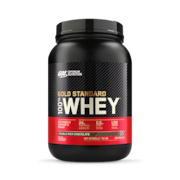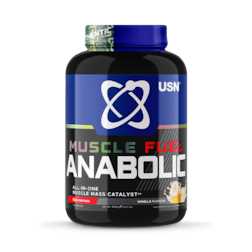15% off €35 or 20% off €45
Code:SUMMER
Your ultimate guide to bulking powders

Bulking protein powders can help you gain weight and build muscle mass. Find our top picks for your fitness goals, with tips from our nutritionist
Our top picks
Low sugar, with only 0.7g

Optimum Nutrition
Optimum Nutrition Gold Standard 100% Whey Protein Double Rich Chocolate 899g
€45.99
Whether you’re a seasoned bodybuilder or someone who struggles to put on muscle, bulking powders can be an essential part of your fitness regime.
Bulking powders are protein supplements that can help you build muscle.1,2
“If we don't have an adequate protein intake alongside exercise, we won't be able to build muscle,” explains H&B nutritionist Emily Foster.
You should get your protein from your diet wherever possible, but sometimes you might need a little extra help.
Discover what protein powders you can use for your fitness journey and how to use them. We’ll also share our top choices to help you choose the right one for your individual goals.
What is bulking?
Bulking is a popular method used by bodybuilders and athletes to gain weight and muscle.3,4
During the bulking phase, a surplus of calories is consumed to gain weight.5 This is combined with weight training and exercise to help build muscle and fat. Bodybuilders then follow up with a cutting phase to lose excess weight.3
While it’s generally agreed that eating more calories helps lead to weight gain,5 extreme fluctuations in weight may put you at risk of poor health outcomes.6 Overconsumption of junk food and highly processed foods, also called ‘dirty bulking’, may put you at risk of high blood sugar levels, obesity and type 2 diabetes.7-9
A ‘clean’ bulking approach involves eating a tightly controlled calorie surplus and sticking to healthier or unprocessed food.10
Can protein powders help with bulking?
If bulking is your goal, getting enough daily protein and carbs is essential to putting on muscle mass and maintaining strength.2 Research has found that combining exercise and resistance training with sufficient dietary protein and a balanced diet can also help you to build muscle.11
“For someone who’s regularly doing sports and exercise – particularly strength training – research suggests that around 1.2-2 grams of protein per kilo of bodyweight is optimal,” Emily says.12
When used as part of a clean bulking diet, protein powders can help you achieve your daily protein goals.1
Some common protein powders that you can use for bulking up include:
- whey protein powder
- casein protein powder
- mass gainers
- vegan protein powders (soy, pea, hemp and rice)13,14
What is mass gainer protein powder?
Mass gainers are just one type of bulking protein powder. They’re specially formulated blends that combine protein (typically whey protein) with high-carbohydrate ingredients and fats.15
If you want to gain weight and muscle mass by increasing your calorie intake, you may find that mass gainers can help you meet your daily calorie goals – especially if you struggle to do so through diet alone.5,15
How to use bulking protein powders
“For a lean bulk, you might want to moderately increase your calories using nutritious foods that provide your body with vitamins and minerals. An easy way to do this is simply to upgrade your protein smoothie. So instead of just having protein powder with water or skimmed milk, you might switch to full fat milk and throw in some oats, nut butter, fruit and chia seeds,” says Emily.
“For a bigger bulk-up, a mass gainer will deliver a high protein content, which will contribute to muscle growth and maintenance, along with carbs which act as your body's main energy source to help fuel recovery.”
You can incorporate bulking powders into your diet however works best for you. Many people mix or blend their protein powder with water, milk or their favourite beverage. You can also add them to smoothies, stir them into soups or even use them in your favourite baking recipes.
Some people also like to take bulking powders after their workout. When ingested immediately or up to two hours after your workout, protein supplementation may help stimulate muscle growth.16,17
However, the latest research suggests that hitting your overall daily protein goal is more important than timing. If your goal is bulking up and maintaining muscle mass, it may be best to time your high-quality protein consumption throughout the day in three-to-four-hour increments.11,16,18
Preferably this protein should come from a range of food sources in your diet including plant proteins, but if you’re struggling, then you can supplement with protein powders ‒ more on this below.
Our top picks for bulking protein powders
Which bulking protein powder is best depends on your fitness and nutrition goals, workout intensity and dietary restrictions.
Here are our top choices, all suitable for vegetarians.
This all-in-one high-protein, high-energy drink contains protein from five different sources, plus creatine, free-form amino acids, vitamins, minerals and added sugars and sweeteners.
Per serving, there’s 54g of blended protein from five different sources. It also contains a range of essential and branched-chain amino acids (BCAAs) for optimal protein absorption.20,21
Flavours include:
- vanilla
- strawberry
- cookies and cream
- chocolate
- banana
- caramel
- peanut
Add three heaped scoops to 500‒600ml of cold water and blend or shake with a hand-held shaker for about 30 seconds.
Whey protein powder has a reputation for enhancing muscle growth ‒ learn more about it in our ultimate guide to whey here.
This Gold Standard Whey Protein from Optimum Nutrition is ideal for anyone who wants to make the most of their workout and help build muscle mass.
Each serving contains 24g of high-quality whey protein isolate and concentrate blend, and 5.5g of naturally occurring branched-chain amino acids (BCAAs).
And there are 11 flavours to choose from, including chocolate hazelnut, chocolate mint, white chocolate and raspberry and more.
Add one heaped scoop (around 30g) to 180-240ml of cold water and stir, shake or blend until dissolved.
The final say
You can use whey, casein or plant-based protein powders for bulking, or choose a specifically formulated mass gainer or all-in-one sports formula that includes creatine.11,12
But that’s not the only way to fuel your body. Learn how to get enough protein in your diet and why rest is essential for muscle growth too.
Finally, always consider your fitness and nutrition goals and check with your GP, dietitian or healthcare professional before starting any new weight-related programme.
The advice in this article is for information only and shouldn’t replace medical care. While we strive for accuracy and balance, please be aware that this article may discuss products available for purchase through Holland & Barrett. Please check with your GP or healthcare professional before trying any supplements, treatments or remedies. Food supplements mustn’t be used as a substitute for a varied and balanced diet and a healthy lifestyle.
1. Morton RW et al. A systematic review, meta-analysis and meta-regression of the effect of protein supplementation on resistance training-induced gains in muscle mass and strength in healthy adults. British Journal of Sports Medicine. 2018.52(6):376–84. Available from: https://bjsm.bmj.com/content/52/6/376.long
2. Carbone JW et al. Dietary protein and muscle mass: translating science to application and health benefit. Nutrients. 2019;11(5):1136. Available from: https://www.ncbi.nlm.nih.gov/pmc/articles/PMC6566799/.
3. Gentil P, et al. Nutrition, Pharmacological and training strategies adopted by six bodybuilders: case report and critical review. European Journal of Translational Myology. 2017;27(1):6247. Available from: https://pmc.ncbi.nlm.nih.gov/articles/PMC5391526/
4. Spendlove J et al. Dietary Intake of Competitive Bodybuilders. Sports medicine [Internet]. 2015 Apr 30 [cited 2024 Jul 19];45(7):1041–63. Available from: https://link.springer.com/article/10.1007/s40279-015-0329-4
5. Leaf A et al. The effects of overfeeding on body composition: the role of macronutrient composition - a narrative review. International Journal of Exercise Science. 2017;10(8):1275–96. Available from: https://www.ncbi.nlm.nih.gov/pmc/articles/PMC5786199/.
6. Rzehak P et al. Weight change, weight cycling and mortality in the ERFORT Male Cohort Study. European Journal of Epidemiology. 2007;22(10):665–73. https://doi.org/10.1007/s10654-007-9167-5.
7. Lane MM et al. Ultra-processed food exposure and adverse health outcomes: umbrella review of epidemiological meta-analyses. BMJ. 2024;384:e077310. Available from: https://www.bmj.com/content/384/bmj-2023-077310.
8. Prentice AM. Overeating: the health risks. Obesity Research. 2001;9(S11):234S-238S. Available from: https://pubmed.ncbi.nlm.nih.gov/11707547/
9. Scherer T et al. Short term voluntary overfeeding disrupts brain insulin control of adipose tissue lipolysis. Journal of Biological Chemistry. 2012;287 (39):33061-9 Available from: https://www.ncbi.nlm.nih.gov/pmc/articles/PMC3463338/.
10. Iraki J et al. Nutrition recommendations for bodybuilders in the off-season: a narrative review. Sports (Basel). 2019;7(7):154. Available from: https://www.ncbi.nlm.nih.gov/pmc/articles/PMC6680710/.
11. Jäger R et al. International Society of Sports Nutrition Position Stand: Protein and exercise. Journal of the International Society of Sports Nutrition. 2017;14(1). Available from: https://www.ncbi.nlm.nih.gov/pmc/articles/PMC5477153/
12. Carbone JW, Pasiakos SM. Dietary Protein and Muscle Mass: Translating Science to Application and Health Benefit. Nutrients [Internet]. 2019 May 22 [cited 2024 Nov 6]. Available from: https://pmc.ncbi.nlm.nih.gov/articles/PMC6566799/
13. Berue S. Vegan Protein Powder Supplements of High Biological Value. Journal of renal nutrition [Internet]. 2012 Jul 1 [cited 2024 Jul 19];22(4):e39–41. Available from:https://www.jrnjournal.org/article/S1051-2276(12)00101-X/fulltext
14. Amatori S et al. Going Vegan for the Gain: A Cross-Sectional Study of Vegan Diets in Bodybuilders during Different Preparation Phases. International journal of environmental research and public health/International journal of environmental research and public health [Internet]. 2023 Mar 15 [cited 2024 Jul 19];20(6):5187–7. Available from: https://www.mdpi.com/1660-4601/20/6/5187
15. Hoffman J et al. Effects of a pre- and post-exercise whey protein supplement on recovery from an acute resistance training session. Journal of the International Society of Sports Nutrition. 2008 Sep;5(S1). Available from: https://pmc.ncbi.nlm.nih.gov/articles/PMC3313117/
16. Kerksick CM et al. International Society of Sports Nutrition position stand: nutrient timing. Journal of the International Society of Sports Nutrition [Internet]. 2017 Aug 29;14(1). Available from: https://www.ncbi.nlm.nih.gov/pmc/articles/PMC5596471/.
17. Naclerio F et al. Whey protein supplementation and muscle mass: current perspectives. Nutrition and Dietary Supplements. 2019;11:37–48. Available from: https://doi.org/10.2147/NDS.S166195.
18. Schoenfeld BJ et al. Is there a postworkout anabolic window of opportunity for nutrient consumption? Clearing up controversies. Journal of Orthopaedic & Sports Physical Therapy. 2018;48(12):911–914. Available from: https://www.jospt.org/doi/10.2519/jospt.2018.0615#_i5.
19. Church DD et al. Essential amino acids and protein synthesis: insights into maximizing the muscle and whole-body response to feeding. Nutrients. 2020;12(12):3717. Available from: https://www.mdpi.com/2072-6643/12/12/3717.
20. Jackman SR et al. Branched-chain amino acid ingestion stimulates muscle myofibrillar protein synthesis following resistance exercise in humans. Frontiers in Physiology. 2017;8:390. Available from: https://www.frontiersin.org/articles/10.3389/fphys.2017.00390/full






